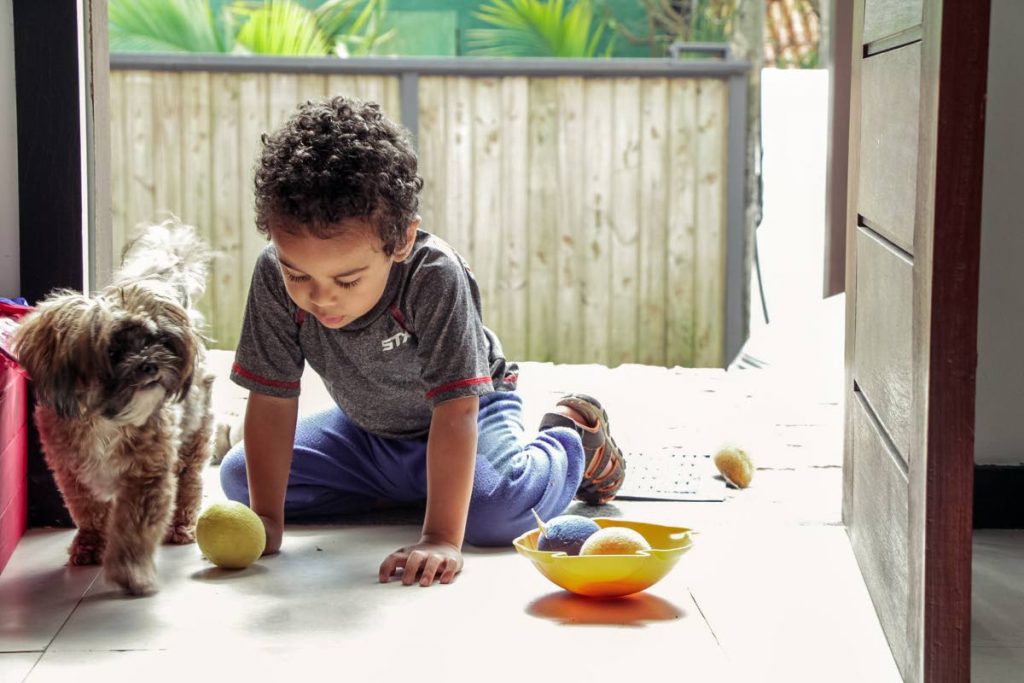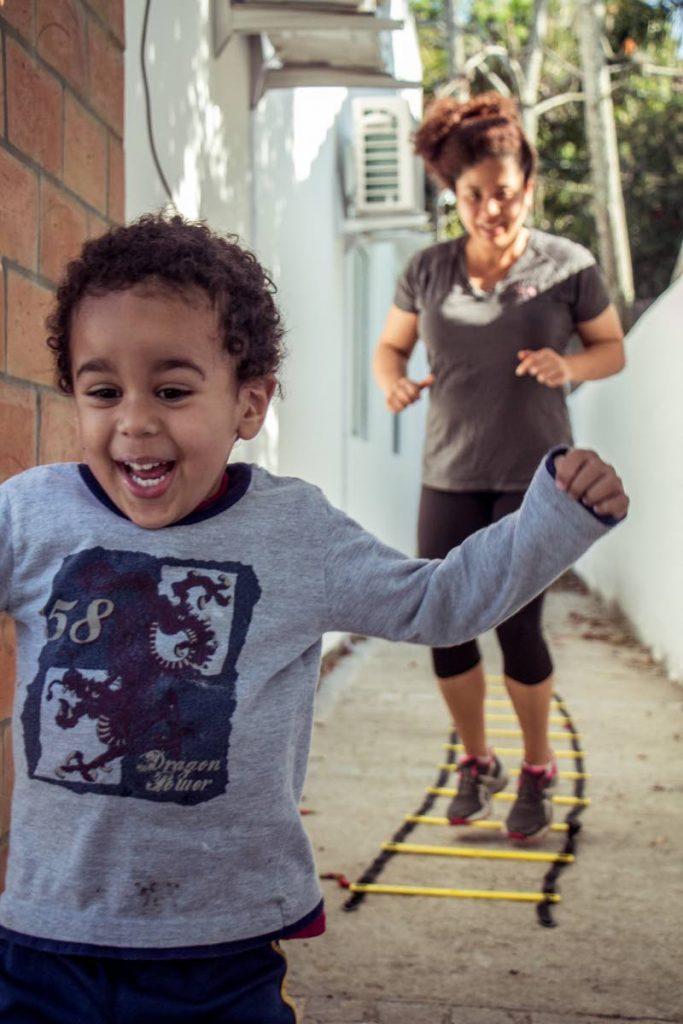Seeing past autism

The dreams 37-year-old Natasha Kelly has for her son, Luca, may not be those traditionally held by other parents. The Diego Martin mother’s biggest dream for her child is that he be seen by others for who he truly is. Her greatest fear is not knowing what will happen to him when she is not there. “Me, as a mother, I am already thinking about Luca’s future. And my greatest fear, and I am sure it is the greatest fear of any parent of a special needs child, is their future. ‘When I am not here, what will happen? ‘Is the fabric of this community strong enough to support them when we are not here?’ I ask myself that almost every day,” she said taking an audible breath.
Kelly’s son has autism spectrum disorder (ASD), a condition characterised by challenges with social skills, repetitive behaviors, speech and nonverbal communication.
While Kelly has a 62-year-old autistic uncle (Uncle Louis), it took her some time before she realised Luca too was autistic.
“Luca is four-years-old, he was born in 2013, and his development, I always thought was a little behind...And the paediatrician always told me ‘Don’t worry. He’ll be fine.’ When he started going to day care, at 18 months, it took longer than usual for him to adapt in comparison to other children.”

She thought at that time, “Oh my God he is so resistant to that, boy. He is a stubborn little bugger.”
It took eight weeks for Luca to become somewhat comfortable with the idea of being in a strange place. She also noticed that he was always attached to one particular teacher and wouldn’t “care to venture near anyone else.”
When, Luca hit the two-year milestone, she said every time she went to pick him up, he would be in a corner by himself. “Doing his own thing which was usually playing with play dough, a ball or something round, but really fixated with it.”
Even though, she expressed concerns to the teachers she would be told children that age don’t usually interact with each other.
“At two years old, he just said one thing ever, which was Peppa from Peppa Pig...I can’t remember getting another word out of him for a while after. And when he did start to talk, it was really him repeating things I said or his teachers said. It did not seem like it was his words.”
Even though paediatricians and teachers told her every child develops in their own time, she was getting worried because he was almost three and his meltdowns had not stopped.
Kelly said when they visited the mall Luca would always want to be lifted and when she refused he would scream and cry, so she avoided the mall. At the grocery, she noticed, he would fixate on the wheels of the trolley. “What kind of made me realise something really is up here was one of his fixations became the washing machine. He would sit in front of the washing machine and just look at the clothes spin around, and around, and around. When you tried to move him, he would get upset, and I remembered when I was younger my uncle also always wanted to be near the washing machine, lawn mower or anything that vibrates or has that kind of humming sound. My uncle would be attracted to these sounds and then I suspected that Luca might be autistic.”
Even though she suspected she continued with “regular education protocol” and enrolled him in a regular school at three.
She soon realised that the environment was too overwhelming for him.
She took Luca for an assessment and “When I got the results of the assessment, it was recommended that I place Luca into an early intervention programme.”
She got him into Right Start (an early intervention programme for young children with autism run by Donnella Rodriguez-Laird and Shirlon George) and has since seen a change. “A lot of improvement, in terms of his ability to communicate, his speech, they are helping him cope with the fact that his brain his different and interprets things differently.”
Kelly said the experience has been very challenging. “It was really hard in the beginning. I remember thinking Luca would never sleep through the night, he did not begin sleeping through the night until maybe three and a half years old. And at times I felt like lost. He is my only child and I am thinking I am doing something wrong.”

Initially, she said, everyone had told her to get a handle on his tantrums, but she knew it was more than that. Even though her uncle is autistic and she grew up around him, she never identified with it until her son was diagnosed with it. Now, she said, she can put herself in her grandmother’s shoe in the 1950s and early 60s when not much was known about autism. According to WebMD, autism was first used by Eugen Bleuler, a Swiss psychiatrist around 1911 to refer to one group of symptoms related to schizophrenia. In the 1940s, researchers in the United States began to use autism to describe children with emotional or social problems. Kelly said her uncle was given LSD (Lysergic acid diethylamide), a psychedelic drug, to treat with autism.
She knows for a fact that autism does not make her son or her uncle any less than a person without the condition. She said having an extended family helps a lot. “If mummy is not around, daddy is around, grandma is around, aunties, uncles. So he is always in a very social environment.” And she has noticed a special bond between Luca and Uncle Louis. “Uncle Louis just has to touch Luca, if he is doing something that he is not supposed to be doing and Luca would immediately stop.”
But while her family is supportive of caring for Luca, she can’t say the same of TT. She said TT is not a society geared toward truly caring for special needs people. “As much as I would like to believe that awareness highlighting whether it is autism or Down Syndrome or particular months or days, would help the situation. It really it is up to people who have the power to make change, to make it happen.”
Being cautious not offend people, who she said have been more actively involved in the community than she is, Kelly said, “What I do realise and have voiced is that the success of my son and children and people like him is totally dependent on the strength of the community they are in and the provisions that our communities make for our kids.”
Emphasising that finances have been the most challenging aspect of raising Luca, Kelly said, “I would like to see possibly parent co-operatives formed in such a way, where we can pool our resources together. We can form these communities ourselves in some way, whether it is through a bakery or a grocery...where we come together and create a space for people with disabilities to thrive because they can contribute to society.”
Kelly’s Uncle Louis never got the opportunity to work, but at home he was always made to participate in chores. “He would wash the dishes, wash clothes, clean-up. These little routines, he is very good at.”
In TT, she said, there were no public facilities for children like Luca. Therapy and the help he needs can only be accessed privately.
“I remember when I first went to Right Start, I was so happy after the conversation with Donnella and Shirlon and I went back to the school Luca was in and I was telling the teacher, ‘Oh my gosh I am so happy. I think I found the right place. I feel like Luca will thrive and do so well.
“The teacher there said ‘I am so happy because they see him.’ For me, those words meant a lot. I see Luca...I know him. He is a comedian. He loves animals. He is just like any other child and so loving.
“I was so happy to hear someone say they see him. They see past autism. And they see his little personality and potential. Those words for any parent with a special needs child, warms your heart. That is all you want for your child, for people to see who they are,”she said, the emotion filling her voice.


Comments
"Seeing past autism"